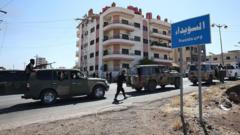The encounter between Donald Trump and Syria’s interim President Ahmed al-Sharaa, once deemed improbable, heralds potential normalization of relations. With the lifting of sanctions, optimism rises among Syrians for reconstruction and the return of exiles, though challenges remain.**
Trump's Historic Meeting with Syria's Interim President Sparks Hope for Change**

Trump's Historic Meeting with Syria's Interim President Sparks Hope for Change**
President Trump’s recent meeting with Ahmed al-Sharaa in Riyadh marks a significant shift in U.S.-Syria relations, raising hopes for a more stable future for the war-torn nation.**
In a surprising turn of events, President Donald Trump met with Syria's interim President Ahmed al-Sharaa in Riyadh, signaling a potential shift towards normalizing relations with Syria. Just months after declaring that the U.S. had "no interest in Syria," Trump's comments following the meeting have ignited optimism among Syrians who have suffered through over a decade of civil conflict.
The 37-minute meeting took place at a lavish Saudi royal palace, attended by Saudi Crown Prince Mohammad bin Salman and Turkish President Recep Tayyip Erdogan via phone. Trump’s affirmation of Sharaa’s potential for leadership, alongside the recent decision to lift U.S. sanctions on Syria, has energized discussions about a brighter future for the region.
"It's a new light at the end of this tunnel," stated Hind Kabawat, Syria's minister of social affairs, highlighting the desperate need for sanctions relief. Removing these financial restrictions is expected to facilitate humanitarian aid and invite foreign investments, providing much-needed relief to a population suffering under dire economic conditions.
Despite the celebration triggered by these developments, experts caution that the actual lifting of comprehensive sanctions will require significant diplomatic effort and commitment from the Trump administration. As regions linked to the Syrian government reassess their strategies, Trump’s administration has made it clear that any normalization would hinge on Syria joining the Abraham Accords, an agreement aimed at fostering ties between Israel and various Arab states.
Amidst the challenges of addressing militant affiliations and the ongoing suspicion from international powers, Sharaa's willingness to discuss cooperation and normalization speaks to a desire for stabilization. If successful, this engagement could not only reassure exiled Syrians but also allow the interim government to take strides towards reconstruction, providing hope for a nation in need of profound change.
As the dialogue unfolds, both community and regional leaders will need to ensure that the momentum for engagement does not wane, marking a crucial moment for the future of Syria and its people.
The 37-minute meeting took place at a lavish Saudi royal palace, attended by Saudi Crown Prince Mohammad bin Salman and Turkish President Recep Tayyip Erdogan via phone. Trump’s affirmation of Sharaa’s potential for leadership, alongside the recent decision to lift U.S. sanctions on Syria, has energized discussions about a brighter future for the region.
"It's a new light at the end of this tunnel," stated Hind Kabawat, Syria's minister of social affairs, highlighting the desperate need for sanctions relief. Removing these financial restrictions is expected to facilitate humanitarian aid and invite foreign investments, providing much-needed relief to a population suffering under dire economic conditions.
Despite the celebration triggered by these developments, experts caution that the actual lifting of comprehensive sanctions will require significant diplomatic effort and commitment from the Trump administration. As regions linked to the Syrian government reassess their strategies, Trump’s administration has made it clear that any normalization would hinge on Syria joining the Abraham Accords, an agreement aimed at fostering ties between Israel and various Arab states.
Amidst the challenges of addressing militant affiliations and the ongoing suspicion from international powers, Sharaa's willingness to discuss cooperation and normalization speaks to a desire for stabilization. If successful, this engagement could not only reassure exiled Syrians but also allow the interim government to take strides towards reconstruction, providing hope for a nation in need of profound change.
As the dialogue unfolds, both community and regional leaders will need to ensure that the momentum for engagement does not wane, marking a crucial moment for the future of Syria and its people.























